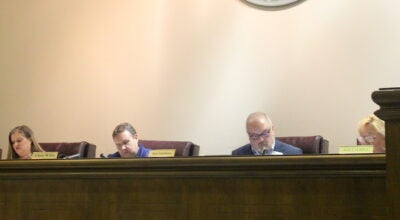‘Captain Compost’ visits Alabaster
Published 4:21 pm Tuesday, February 14, 2012

William Cureton, who lives in Odenville and goes by the name "Captain Compost," speaks with members of the Alabaster Senior Center during a Valentine's Day visit. (Reporter Photo/Jon Goering)
By NEAL WAGNER / City Editor
Gardeners and farmers can use items ranging from grass clippings to fish scraps to create an all-natural, powerful crop fertilizer in their backyards, an Odenville man known as “Captain Compost” told a group of Alabaster senior citizens on Jan. 14.
William Cureton II, who operates a large compost-fueled farm in Odenville with his wife, Peggy, spent Valentine’s Day morning explaining ways to make and use compost as a crop fertilizer.
“Everything you need is in your garbage can,” Cureton told the group. “With all the technology we have today, we still can’t mimic the things that happen naturally in composting.”
Cureton said most compost piles consist of “greens,” which includes items such as kitchen scraps and grass clippings, below a layer of “browns,” which includes items such as hay, leaves or pine needles. He also suggested adding “natural actuators,” such as soft drinks, stale beer or liquid or dry molasses, to the compost pile to speed up the process.
After the items are mixed into a pile outdoors, the pile must sit for several weeks until it begins to turn dark and crumbly and doesn’t smell bad, Cureton said.
Cureton said leaves and used coffee grounds should be a part of every compost pile.
After the compost pile is complete, the material can then be spread onto gardens or mixed with non-chlorinated water to create a “compost tea.” Once the compost gets into the soil, it can stay there for 10-20 years, he said.
“Synthetic fertilizers don’t last anywhere near as long as compost does in the soil,” Cureton said, noting compost adds minerals such as phosphorous and nitrogen to the soil and attracts beneficial organisms, such as earthworms. “But it sounds so radical to some people.”
Cureton criticized using synthetic, store-bought fertilizer on crops, and said doing so was “like putting your plants on drugs.”
“When you use synthetic fertilizers, you are making the plants get what you want them to get right now,” he said. “That’s the great thing about nature. It lets your plants get what they need when they need it.”
Cureton also said healthy plants naturally repel pests, such as grubs and termites.
“Pests attack the weakest plants,” Cureton said. “If your plants are on a good diet, they will be healthy.”
To learn more about Cureton and his farm and composting techniques, visit Captaincompostalabama.com.









